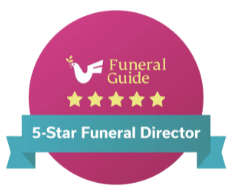Our A-Z Glossary of Funeral Terms
A glossary of funeral terms, including funeral directors, funeral homes, coroners, morticians, burial, cremation, estate management and bereavement support.

- Administrator The person responsible for managing the estate of a person who has died if they had not written a will, not named an executor in their will, or the executor they had named has renounced their responsibilities. See Executor and Letters of Administration.
- Ashes The remains of someone who has passed away, after their body has been cremated.
- Ashes Casket An ashes casket is a box that holds cremated remains (known as ashes) following a cremation. Usually, the ashes are placed in a cardboard box or polyurn (plastic urn) provided by the crematorium unless instructed otherwise. There are a wide range of ashes caskets available including(...)
- Beneficiary A person who is named in a Will, or through life insurance, to receive an asset (i.e. a specific property) or share of the estate (i.e. ¼ or 25%).
- Crematorium A crematorium, crematoria plural, is a building that holds the cremator equipment to facilitate a cremation. Most crematoria have a large chapel so that families can hold the funeral service on the site of the cremation.
- Funeral Celebrant A Funeral Celebrant, commonly known as a celebrant, if an officiant that leads a non-religious funeral service. For religious services the funeral would be led by the minister of the deceased's local parish church unless they attend a specific church. A celebrant differs to a minister as(...)
- Celebrant A Funeral Celebrant, commonly known as a celebrant, if an officiant that leads a non-religious funeral service. For religious services the funeral would be led by the minister of the deceased's local parish church unless they attend a specific church. A celebrant differs to a minister as(...)
- Green Certificate You may be asked for a Green Certificate, abbreviated to a Green Cert. The official term for this document is the Registrar's Certificate for Burial or Cremation. This certificate has a few uses: Firstly, it is common that a hospital will not allow a funeral director to collect a(...)
- Green Cert You may be asked for a Green Certificate, abbreviated to a Green Cert. The official term for this document is the Registrar's Certificate for Burial or Cremation. This certificate has a few uses: Firstly, it is common that a hospital will not allow a funeral director to collect a(...)
- Hearse A hearse is a specialist vehicle used to transport a coffin during a cortege/ceremony. Traditionally a horse-drawn hearse but now a motor hearse is much more common due to public perception of a modern day funeral, their lower cost of running and the distance travelled to different(...)
- Hearsette A hearsette, sometimes known as a private ceremonial vehicle, is an adapted estate car used as a replacement for a traditional hearse. A hearsette will usually have quite darkly tinted windows and a full hearse decking system installed. A hearsette is commonly used to create a more(...)
- Next of kin Someone’s closest living relative, usually a spouse or child.
- Pallbearer A pallbearer, also known as a coffin bearer, casket bearer or simply, bearer. A pallbearer is one of several people who carry the coffin during a funeral. In traditional British Culture, there would be 4, 6 or 8 male family members, friends, colleagues or members of staff to carry the(...)
- Bearer A pallbearer, also known as a coffin bearer, casket bearer or simply, bearer. A pallbearer is one of several people who carry the coffin during a funeral. In traditional British Culture, there would be 4, 6 or 8 male family members, friends, colleagues or members of staff to carry the(...)
- Wake A gathering for friends and family of the deceased, usually after the funeral service, where mourners can reflect on the person who has died.




